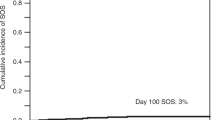Abstract
Hepatic veno-occlusive disease (VOD) is a well-known complication of chemotherapy in Wilms tumor patients, particularly young children. Although this complication resolves uneventfully in most patients, fatal cases have been reported. Severe VOD after transplantation has a high mortality rate ranging from 45% to 98%. New hemostatic therapeutic strategies have significantly improved the prognosis of VOD. Chemotherapy-related VOD in Wilms tumor usually has a good prognosis. We describe two patients with Wilms tumor and one with acute lymphoblastic leukemia, who developed severe veno-occlusive disease of the liver according to the Baltimore criteria while undergoing chemotherapy; the symptoms were hepatomegaly, ascites, hyperbilirubinemia, weight gain and, in one patient, short-term lethargy. Elevated LDH levels of 872 to 12,000 U/l were observed in our patients. All patients had thrombocytopenia between 29,000 and 40,000/μl and decreased antithrombin (AT) and protein C levels; two patients had gastrointestinal bleeding. All patients developed a coagulopathy because of severe hepatic dysfunction. Two patients received low-dose heparin at the onset of VOD. The thrombolytic therapy was rapidly changed to AT supplementation (20–80 IU/kg bw 2× per day) without heparin when thrombocytes were very low or gastrointestinal bleeding occurred. Resolution of VOD was observed in all patients receiving AT alone. The chemotherapy was discontinued in a patient with accidental actinomycin D overdosage in view of the severity of symptoms. The remaining two patients received chemotherapy according to the therapy protocol after restitution. All patients survived without sequelae with a median follow-up of 28 months (range 8–48 months).
Conclusion Hepatic veno-occlusive disease is a rare but increasingly recognized complication in pediatric cancer patients receiving conventional chemotherapy. AT supplementation constitutes a good alternative treatment of severe VOD in comparison with other thrombolytic therapies, particularly in patients at high risk of bleeding.
Similar content being viewed by others
Author information
Authors and Affiliations
Rights and permissions
About this article
Cite this article
Mertens, R., Brost, H., Granzen, B. et al. Antithrombin treatment of severe hepatic veno-occlusive disease in children with cancer. Eur J Pediatr 158 (Suppl 3), S154–S158 (1999). https://doi.org/10.1007/PL00014344
Issue Date:
DOI: https://doi.org/10.1007/PL00014344




